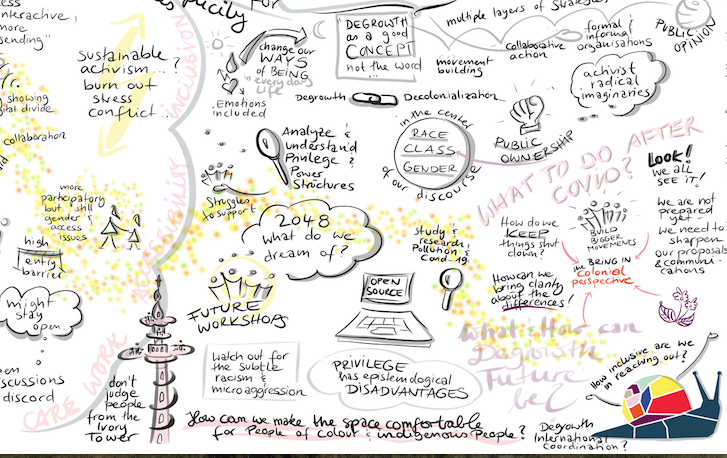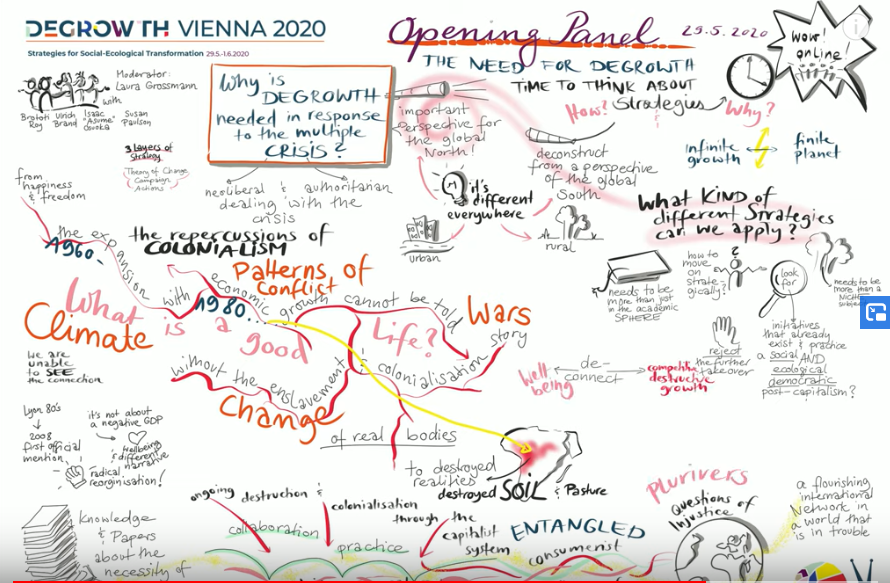Degrowth.info has reached its 10th anniversary this year. To celebrate this, we would like to give you some insights into our collective’s history.
Degrowth.info emerged as the website of the 4th International Degrowth Conference that took place in Leipzig, in 2014. This conference, as well as the website, was set up by Konzeptwerk Neue Ökonomie (KNOE), a non-profit organization working towards a socio-ecological transformation of the economy. In the period leading up to the conference and immediately after, the website generated a lot of interest and many visits. Therefore, the idea emerged to transform the conference website into a portal, in order to continue successfully spreading degrowth ideas. It then became the main website to provide information about the international degrowth conferences; the library was created in order to have a repository of the papers and conference presentations; projects such as ‘Degrowth in Movements’ and the ‘Global Degrowth Day’, and groups such as the Feminist and Degrowth Alliance (FaDA) were given a platform.
In 2018, a call was sent on the ‘degrowth world’ mailing list, inviting individuals from around the world to join the editorial team. The website was at the time still maintained by the German team of KNOE, and there was a will to pass on the website to a team composed of people from different backgrounds, cultures and countries, with a small budget to work with. About 15 volunteers joined the collective at that time and started having monthly calls and forming working groups. We didn’t know each other, we didn’t know how to organize online, but we shared the enthusiasm of spreading degrowth ideas. Slowly, month after month, we got to know and appreciate each other. From a basic structure of working groups and a team coordinator, year by year, we added new elements to our governance, evolving organically. We cultivated clear and open spaces for communication, implemented inclusive and horizontal decision making processes, and developed a practice of collective care with dynamics that protected us from activist burnout.
Volunteer and paid members. For the majority of our history, we have been a predominantly volunteer based collective. Yet, we are aware of privilege and blind-spots. We question: who are those individuals with head-space and productive hours to spare? Who ends up doing the collective’s housekeeping and reproductive work? As we examine these issues we dive deeper and deeper into what intentional, non-hierarchical dynamics consist of. Over time, we have successfully disentangled access to paid hours from patriarchal/vertical structures with a system of retribution to the members of our collective who require it. By sharing funds according to needs not tasks and rotating the distribution of paid hours as people's lives and financial stability changes, we counter privilege and enact a tangible strategy for inclusion. The amount of paid team hours has varied significantly over time depending on our budget, but has always been one of the most useful forms of investment of our limited funds. As we see it, providing access to paid work is a way to antagonize structural inequality and remain faithful to our collective’s mandate to prioritize inclusion and solidarity.
Horizontality. Horizontal governance requires time, head-space and motivation, and we therefore implement various mechanisms to avoid both power accumulation and activist burnout. For example, we regularly rotate the role of the team’s coordinator, we make use of consensus decision-making, and we ensure great transparency and clarity in our processes, remaining vigilant of power dynamics, colonial attitudes and patriarchal biases.
Political friends. Over the years we have developed very deep personal bonds. Beyond degrowth, we believe that this personal bond, this ‘political friendship’ as we call it, and the laughter during our calls, is the glue that keeps us together. The following quote from the book Joyful Militancy resonates a lot with us: "What makes people fight for each other, support each other in radical ways, and construct durable, loving bonds? (...) We do not think the answer is ideology; abstract political values might support short-term alliances, but we doubt their capacity to be the glue that holds people together in the long term. Instead, we suggest that strong relationships are the foundation of resistance. Recovering and sustaining deeper forms of friendship and kinship are indispensable for undoing Empire’s hold."
Funding and fundraising. Staying politically independent is not easy as soon as we enter the world of grants and calls for tender. It is common to slowly find the general direction of a project be adapted to the political will of funders. Our willingness to stay completely independent has implied to work with a very limited budget, think carefully about our sources of funding, and how much time we are willing to dedicate running after money. If you want to support our independent work, join us on Patreon!
It is not always easy to describe all the things that degrowth.info does. Along the years, we have been involved in various projects. Some are directly connected to the website, such as transferring the website from a WordPress version to the current version that we host ourselves, via a crowdfunding campaign that saw our community come together; hosting and participating in the Open Letter: Re-Imagining the Future After the Corona Crisis; or organizing a strategy blog series which provided the impulse for an international degrowth conference on the same theme. Outside of the general upkeep of the website, we also organize sessions at international degrowth conferences, give presentations at universities and workshops in cultural centers, and speak to the press. We have also participated in a documentary about degrowth, joined an international campaign about access to water in Rojava (North-East Syria) and written collaborative pieces such as: A degrowth perspective on the coronavirus crisis, Degrowth strategies: thinking with and beyond Erik Olin Wright, Degrowth actors and strategies: towards a Degrowth International, and Alternatives to mainstream publishing within and beyond academia.
As the most comprehensive website for information on degrowth, it is important to us to be deeply involved in the degrowth movement and in constant connection with various other degrowth groups, or related struggles. KNOE, our mothership, legally hosted us for many years, until we were finally ready to fly independently in 2022. We also shared a newsletter with KNOE and Research & Degrowth (R&D), a great communication tool for the degrowth community with over 7000 subscribers from all over the world – you will be hearing back about this very soon... We have participated in the degrowth assemblies and brought up proposals for the movement, that inspired in part the creation of the International Degrowth Network (IDN), an instance we proudly support and whose flourishing into a space for robust, legitimate, transparent collaboration and strategizing we look forward to. Finally, as the top search engine result for the keyword degrowth, we receive emails from individuals and groups from all over the world and act as an ‘invisible secretary’ for the movement, redirecting requests to where they can best be addressed.
It has now been ten years since KNOE created degrowth.info, and six years since our current team was born. In 2018, we were a group of people gathering to work on a project started by others; it took a while for us to form as a collective and shape the degrowth.info project into our shared vision. We first had to find our voice and define our values, which extended through 2021 and 2022 as we articulated our vision and mission. Since then, it has become clear what the team most strives for: making the connections between degrowth and movements on-the-ground for social and environmental justice, increasing the resonance and visibility of voices less heard in degrowth, and especially perspectives from people facing structural discrimination.
Throughout all these years, we have faced some great challenges: be they financial, administrative or even interpersonal. And we are still here today, finding purpose in our collective, making sense of the wider world together, caring for one another, and trusting our ability to navigate all types of waters. While we can’t say in what form degrowth.info will exist in ten years from now, you can expect us to stay around for a while, “at least as long as degrowth is needed” as our team member Olzhas says!
We want to thank all the people who are or have been part of the degrowth.info team, for the unique and valuable contributions they have made over the years: Andro, Anya, Beryl, Carol, Christiane, Christoph, Constanza, Eleonora, Eva, Federico, Gabriel, Hamsa, Hannah, Ishaan, Jacob, Joe, Joëlle, Johannes, Jonathan, Kai, KC, Livia, Marina, Martin, Minna, Nathan, Nick, Nina, Noémie, Olzhas, Renda, Ruth, Riccardo, Samantha, Tom, Zvone.

In this announcement, the Global Degrowth Day organising team talk through the selection of care as the theme for the 2021 edition of the event. In our search for a theme for next year’s Global Degrowth Day, taking place on June 5th 2021, we launched a call for ideas back in October, and a poll in November. These were the results: The results reflect the multiple angles and aspira...

This is part two of a piece reflecting on the Vienna degrowth conference and considering how to move forward based on the inputs and insights from the conference. You can read part one (focused on the conference) here. The idea of organizing the Degrowth Vienna 2020 conference was at least in part connected to a piece that some conference organizers published in this blog in which they crit...

The conference “Degrowth Vienna 2020: Strategies for Socio-ecological transformation” took place online between May and June 2020, in the midst of a pandemic crisis. This two-part piece will firstly reflect upon the conference (part I) and then propose ways to move forward (part II). As a member of the Advisory Board, I was partly involved in the discussions regarding the planning of the...